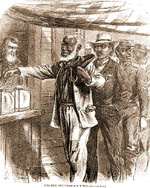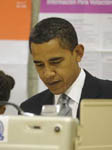If U.S. News Goes Under, What Will Law Professors Complain About?
 Law professors, and particularly law school deans, love to complain about the law school rankings done every year by U.S. News & World Report. (Unless their school rises in the rankings, in which case they are an objective measure of merit.) It’s been pretty well demonstrated that, more than a decade into the rankings project, the primary thing the U.S. News rankings measure is how well the school did on previous years’ rankings. In other words, there’s a massive feedback loop going on that is difficult for any one school to break out of. Nevertheless, schools try, because students and even professors, despite their complaints, rely on the rankings to evaluate the worth of various schools.
Law professors, and particularly law school deans, love to complain about the law school rankings done every year by U.S. News & World Report. (Unless their school rises in the rankings, in which case they are an objective measure of merit.) It’s been pretty well demonstrated that, more than a decade into the rankings project, the primary thing the U.S. News rankings measure is how well the school did on previous years’ rankings. In other words, there’s a massive feedback loop going on that is difficult for any one school to break out of. Nevertheless, schools try, because students and even professors, despite their complaints, rely on the rankings to evaluate the worth of various schools.
People have been wondering how to change this dynamic for a long time. Some, like Brian Leiter, have set up their own rankings, although Leiter’s system only measures the top 40 schools or so, where rankings are arguably less important. But what if U.S. News folded? The company seems to be in deep trouble. It’s recently given up on competing with Time and Newsweek in the weekly magazine market, becoming biweekly instead. Today’s New York Times reports that it’s giving up on that plan, too, even before it went into effect: now USN&WR will become a monthly magazine instead. A monthly news magazine? I think the likely next step will be for USN&WR to announce that it’s becoming a magazine with an infinitely long publication cycle, i.e., folding up shop.
If that happens, who will law professors have to kick around anymore?

 In November, 1868, the newly freed slaves in South Carolina turned out to vote in the first presidential election they had ever been allowed to participate in. It was a momentous occasion; hundreds of thousands of persons who had been deprived of their rights for centuries were now finally able to enjoy all of the privileges of citizenship, including the right of suffrage. Voting in the 1860s meant travelling long distances to the county seat to cast a ballot, often requiring an overnight stay; it was an arduous process, but they were eager to make the attempt.
In November, 1868, the newly freed slaves in South Carolina turned out to vote in the first presidential election they had ever been allowed to participate in. It was a momentous occasion; hundreds of thousands of persons who had been deprived of their rights for centuries were now finally able to enjoy all of the privileges of citizenship, including the right of suffrage. Voting in the 1860s meant travelling long distances to the county seat to cast a ballot, often requiring an overnight stay; it was an arduous process, but they were eager to make the attempt.